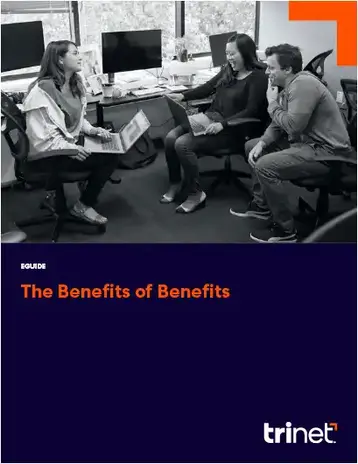
Running a successful business means taking care of your workforce and fostering a strong employee experience. To create a well-rounded employee experience, you need to consider your company culture, onboarding processes, ongoing professional development as well as the array of benefits available. While incorporating options that help promote a healthy work-life balance are becoming increasingly important, traditional benefits are still the benchmark of your employer obligations. These include health insurance coverage and options for retirement planning. Without strong options for either, employee retention could suffer. To help your employees plan for their futures, a good employer-sponsored 401(k) plan is key. Here, we’ll discuss some important details of 401(k) plans.
What is a 401(k)?
A 401(k) is a type of retirement savings plan that’s made available by many employers across the U.S. When eligible employees enroll in a 401(k) plan, a portion of their paycheck is automatically deducted and deposited into an account. These amounts may be invested, which might include mutual funds, stocks, bonds and money market investments. Another investment option, target-date funds, are a combination of stocks and bonds that gradually become more conservative as the individual approaches retirement age. Depending on the 401(k) plan, the employer may match employee contributions, up to a limit.
Employees can determine how much they will contribute each paycheck, but the IRS currently limits contributions to $20,500 for 2022. If employees are over the age of 50, the limit is higher. These contribution limits change yearly, so it’s important to stay up to date.
Generally, the two primary types of 401(k) contributions are traditional pre-tax and Roth. The main difference between the two is that traditional employee contributions are pre-tax, thus reducing taxable income. However, when an individual withdraws money from a traditional 401(k) account, the amount withdrawn is taxable income. Roth contributions are made with after-tax income. Employees will not be able to deduct the contributions from taxable income, but when they withdraw the money, it isn’t taxed again. 401(k) contributions typically cannot be withdrawn prior to the age of 59 ½ without penalty.
The Importance of a 401(k) Retirement Plan
Availability of a retirement plan is an important part of your company’s benefits package, especially when it comes to employee experience. Big companies can provide attractive 401(k) packages and SMBs need to have similar options available to stay relevant. However, many smaller companies find that 401(k) plans may be too expensive or confusing. Business owners may be worried about long-term stability, resources and high investment management fees that may be charged in smaller plans. There are options for business owners, but retirement plan availability provides important and sometimes expected benefits to your employees.
Stronger Savings Plan401(k) plans provide eligible employees with an effective means to build their retirement savings. Since the money is automatically deducted from their paychecks, they don’t need to do anything after the initial setup. This convenience can greatly increase the success of a savings plan over time.
Tax Savings from 401(k)Contributions made into a 401(k) can reduce an employee’s overall taxable income. In addition, 401(k) plans give employees the opportunity to make tax-deferred investment gains and earnings which can help increase the return on investment later in life.
Secure Financial Future Typically, there are penalties for withdrawals made before reaching age 59 ½ which enables most individuals to let their money grow. This can help to create a secure financial future for those looking to enjoy their later years without the stress of working.
Employer Benefits of a 401(k) Plan
There are countless benefits of a 401(k) plan for eligible employees. Companies that don’t make retirement planning support available could experience higher rates of turnover, thereby increasing expenses regarding training and onboarding. In the long run, it’s worth it to make an investment in your employees. Some other employer-related advantages include tax breaks, talent acquisition, increased employee satisfaction and compliance help.
Tax Benefits The primary tax advantage is that employers can deduct employer contributions, such as matching or profit sharing, on the company’s federal income tax return. There are, however, certain limitations to these deductions, so it’s important to evaluate and consult with your tax advisor prior to selecting an employer contribution formula.
Talent Acquisition Strong candidates across various industries look at more than salary. They take into consideration the health insurance plans, non-traditional benefits and the extent of retirement planning offered by prospective employers. When you want to grow your business and secure industry-leading experts, it can be valuable to offer a strong 401(k) plan with a company match. This can help your company stand apart from competition and increases the allure of joining your workforce.
Employee Satisfaction Employee satisfaction is an integral part of your company’s success. Employees who have a positive experience within a company are more likely to stay, be more productive and have a greater investment in the company’s success. Availability of a competitive 401(k) plan boosts employee satisfaction and inclusivity as it fosters a sense of personal investment by their employer.
Compliance There are some state laws across the U.S. that require employers to enroll in state retirement programs if they have a certain number of employees and do not otherwise have a retirement plan available to employees. Not complying with these state requirements could result in costly fines. Additionally, when sponsoring a 401(k) plan there are numerous federal laws and regulations that employers must comply with.
Choosing the Right 401(k) Provider
Selecting a 401(k) provider can be overwhelming for SMBs since many providers have higher fees for smaller plans. To find a quality provider, consider a few factors. First, look at the overall ease of administration. Consider how much effort you’ll need to spend on payroll and administrative tasks to administer and maintain a 401(k) plan. For example, employees adjusting contribution rates can translate to a lot of extra hours updating contributions.
Next, consider how easy it is for your employees to utilize. An ideal 401(k) plan should be easy to use, have a simple interface and provide clear ways to monitor accounts. For a better employee experience, consider working with a provider that also provides educational material to improve understanding on how to make appropriate investment decisions.
Finally, consider the additional fees that 401(k) providers charge. Many SMBs are faced with higher rates due to the small number of people participating.
How a PEO Can Help With 401(k) Plans
Rather than trying to navigate the intricacies of retirement planning on your own, you might consider working with a professional employer organization (PEO). Among other benefits, PEOs help you manage retirement benefits with multiple employer plans that may give your employees attractive packages with competitive fees. PEOs also assist with plan compliance saving SMBs hours on administrative tasks. PEOs typically have some fiduciary liability and can greatly reduce the overall burden placed on your internal team. The PEO will typically assist with maintaining records and employee elections, determining employee eligibility, filing any state or federal reports, handling disclosures or investment information and making sure that employee contributions are deposited timely. Using a PEO can help mitigate risk and give you more time to focus on the pressing needs of your business.
When you work with TriNet, you’ll gain access to HR experts who are committed to helping you save time and money on attractive 401(k) plans. TriNet’s multiple employer retirement plan can help you attract top talent, give your company a competitive advantage and help boost employee retirement savings. Learn how TriNet’s comprehensive HR solutions can help your business today.






